PRINCETON, NJ -- Despite an uptick in economic confidence and a better job situation compared to a year ago as measured by Gallup economic data, consumer spending was down 21% last week from the same holiday week in 2008. Holiday spending is not looking good this year, even when compared to last year's dismal Christmas season, providing little holiday cheer for the nation's retailers.
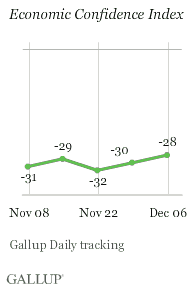
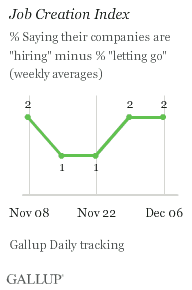
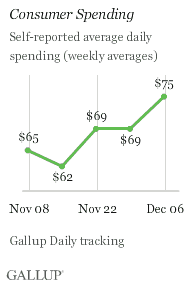
What Happened (Week Ending Dec. 6)
-
Economic Confidence improved a little last week. Gallup's Economic Confidence Index was -28, versus -30 the prior week and -30 for all of November. Americans' views of the country's economic prospects improved, with 38% saying the economy is "getting better," versus 35% and 34%, respectively, the prior two weeks, and 36% for all of November. Fifty-eight percent said the economy is "getting worse," compared to 59% the previous week. Consumer assessments of the current economy were somewhat mixed, with 45% rating the economy "poor" -- a slight improvement from 47% the prior week and 48% for all of November. At the same time, 9% rated the economy "excellent" or "good," compared to 12% the previous week and 11% for November. Overall, economic confidence is up a little in early December compared to its November average.
-
Job Creation was essentially unchanged last week, as Gallup's Job Creation Index was at +2, the same as the prior week and a month ago. Twenty-four percent of employees said their companies were hiring -- essentially the same as the 25% of a month ago -- while 22% said their companies are letting people go, also about the same as the 23% of a month ago. While job-market conditions remain bleak, they exceeded their prior-year comparables last week for the first time this year. Of course, conditions were worsening at this time last year as companies were reacting to the financial crisis and the sharp falloff in economic activity. In 2009, job-market conditions seem to be going in the opposite direction -- currently at their best in comparison to a year ago -- although the unemployment rate as measured by the government is hovering at 10.0%.
-
Consumer Spending continued to disappoint last week, as self-reported daily spending in stores, restaurants, gas stations, and online averaged $75 -- up $6 from the previous week. Given that last week included a pay period, this increase in spending was minimal at best. More importantly, it was down 21% from last year's comparable, when average spending was $95 per day. Still, the average spending for the week was at one of its highest levels of the year and it is not entirely clear how the 2008-2009 spending decrease will affect Christmas gift expenditures versus other discretionary spending such as eating out, traveling, or going to the movies. Regardless, it appears as though there will need to be a major surge in consumer discretionary spending during the next couple of weeks if this year's holiday expenditures are going to come anywhere close to matching last year's dismal performance.
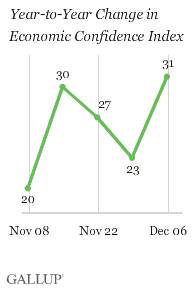
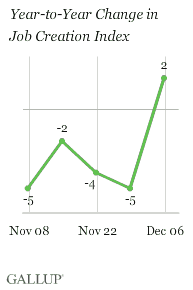
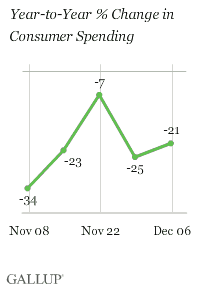
What to Watch For
The decoupling of economic confidence from consumer spending was evident in Gallup's economic data last week. Even as confidence increased for the week and by even more compared to a year ago, consumer spending continued to trail that of last year, by 21% -- and that during a paycheck week. On Friday, Reuters/University of Michigan will report on its preliminary measurement of consumer sentiment for December. Gallup data show confidence up slightly in early December compared to the month of November, and this should be reflected in Friday's report. Regardless, investors should not overreact to the consumer sentiment preliminary report. Not only is it based on a small number of interviews, but Gallup data show that whatever link may have existed between economic confidence and consumer spending in the past, it does not continue in 2009.
Similarly, it may not be wise to overstate the improvement in the job market suggested by last week's employment report. The decline in the number of jobs lost and in the unemployment rate is good news. And Gallup's job data show that job-market conditions today have improved considerably compared to earlier this year. In fact, Gallup's Job Creation Index suggests that hiring and firing conditions are better now than they were at this same time a year ago.
Still, the improvement in the unemployment rate last month resulted in part from a decline of about 100,000 Americans in the labor force, as discouraged workers simply dropped out and stopped looking for work. Further, a survey by Kronos Inc. shows that hiring by the nation's retailers rose to its highest level of 2009 last month, suggesting the job-market improvement may have much to do with new part-time and temporary jobs.
In this regard, probably the most important jobs figure right now is Gallup's hiring measure, which remains in a 24% to 26% range -- essentially where it was at this time a year ago. Most of the improvement in job-market conditions so far in 2009 seems attributable to a reduction in layoffs as opposed to a much-needed increase in job creation.
Last week, just before release of the government's unemployment report, the president held a jobs summit in the nation's capital. Such an effort to address the current job crisis is clearly a step in the right direction. However, it seems clear that much more discussion and idea exchange are needed before political consensus can be reached about what the nation needs to do, not only to prioritize but simultaneously to stimulate new job creation.
While the decline in the unemployment rate from 10.2% to 10.0% may be better than the alternative of a further deterioration, it does not suggest an end to the current jobs crisis. Gallup data suggest that the unemployment rate is likely to increase further next year -- and the increase could be substantial as retailers shed their temporary help, particularly if people who have given up the job search begin to look for jobs again.
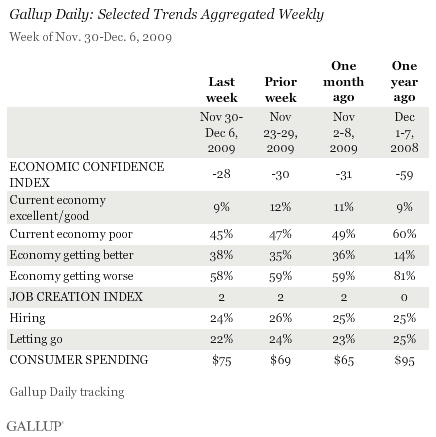
Review and export the complete daily trends on these measures: Economic Indexes; Consumer Spending; Economic Outlook; Economic Conditions; Job Market
Learn more about Gallup's economic measures.
Survey Methods
For Gallup Daily tracking, Gallup interviews approximately 1,000 national adults, aged 18 and older, each day. The Gallup consumer perceptions of the economy and consumer spending results are based on random half-samples of approximately 500 national adults, aged 18 and older, each day. The Gallup job creation and job loss results are based on a random half sample of approximately 250 current full- and part-time employees each day. Results from the week of Nov. 30-Dec. 6, 2009, are based on telephone interviews with 3,375 adults for the consumer perceptions and spending questions. For these results, one can say with 95% confidence that the maximum margin of sampling error is ±2 percentage points. Results for the job creation and job loss questions are based on interviews with 1,939 employees, with a maximum margin of error of ±3 percentage points.
Interviews are conducted with respondents on land-line telephones and cellular phones.
In addition to sampling error, question wording and practical difficulties in conducting surveys can introduce error or bias into the findings of public opinion polls.
